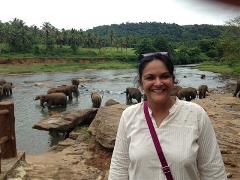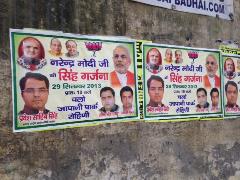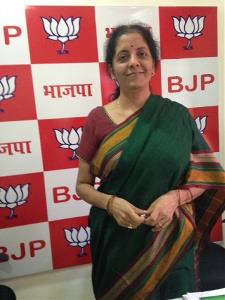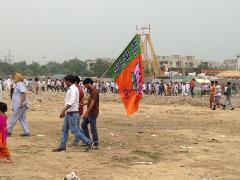Interview with Dr. Rina Williams
Foreign Correspondent
Conducted by Sean Keating, Program Coordinator, Taft Research Center
Rina Verma Willilams is an Assistant Professor of Women’s, Gender, and Sexuality Studies and Political Science. She received her A.M and Ph.D. in Political Science from Harvard University, and B.A. (Political Science) and B.S. (Chemistry) from the University of California at Irvine. Her areas of specialization include South Asian politics; women and gender; ethnicity and nationalism; religion and law; and politics of the developing nations. Her first book, Postcolonial Politics and Personal Laws: Colonial Legal Legacies and the Indian State, was published by Oxford University Press. Her current research examines the role of women and gender in religious nationalism in Indian politics. Before coming to UC, she taught in Virginia and Texas.
Her areas of specialization include South Asian politics; women and gender; ethnicity and nationalism; religion and law; and politics of the developing nations. Her first book, Postcolonial Politics and Personal Laws: Colonial Legal Legacies and the Indian State, was published by Oxford University Press. Her current research examines the role of women and gender in religious nationalism in Indian politics. Before coming to UC, she taught in Virginia and Texas.
S.K.: What are you working on now?
R.W.: This second book project is about religion and politics, and what happens when you mix them up and what we learn about religious politics by looking at women in particular. By looking at the status of women in religious politics, not only what happens to them but how they participate in religious politics, we can learn a lot about religious politics in society more broadly. I am focusing on the BJP (Bharatiya Janata Party), which is the opposition party in the Indian Parliament right now. This movement started back in the 1920s, and it in some ways you can trace it a little earlier, into the late 1800s in different forms. So it has a long history.
By looking at the status of women in religious politics, not only what happens to them but how they participate in religious politics, we can learn a lot about religious politics in society more broadly. I am focusing on the BJP (Bharatiya Janata Party), which is the opposition party in the Indian Parliament right now. This movement started back in the 1920s, and it in some ways you can trace it a little earlier, into the late 1800s in different forms. So it has a long history.
I’m especially interested in how this political party based in religious nationalism deals with democracy in India and how that gets women involved or doesn’t, how it affects women, and how this party actually tries to pull women into what it’s doing. In a democracy, a political party has to get votes - - their purpose is to win elections. It doesn't matter if women are casting those votes or men are casting those votes or anything in between. They need to get votes. And my core argument is that religious politics plays out for women in a democracy in sort of contradictory ways. One the one hand you have religion and nationalism, which aren't necessarily the most liberating ideologies for women. On the other hand you have democratic politics, which says we need your votes. Does that actually pull women into the public sphere, whereas their ideology might say that women should stay in the home? The ways this party has worked out that contradiction over time tells us something important about how a modern democracy works. So in the book, I trace the path of women historically through different phases. In the time periods the BJP did not try to pull women in, they actually failed miserably. What I will show is that over time, the party has learned how to incorporate women. Parts of the book are historical - - I’ve done some archival research that has just been published (“Failure to Launch: Women and the Hindu Mahasabha in Colonial India,” in Politics, Religion and Ideology 13:4). The contemporary part [employs] interviewing and ethnographic observation.
It doesn't matter if women are casting those votes or men are casting those votes or anything in between. They need to get votes. And my core argument is that religious politics plays out for women in a democracy in sort of contradictory ways. One the one hand you have religion and nationalism, which aren't necessarily the most liberating ideologies for women. On the other hand you have democratic politics, which says we need your votes. Does that actually pull women into the public sphere, whereas their ideology might say that women should stay in the home? The ways this party has worked out that contradiction over time tells us something important about how a modern democracy works. So in the book, I trace the path of women historically through different phases. In the time periods the BJP did not try to pull women in, they actually failed miserably. What I will show is that over time, the party has learned how to incorporate women. Parts of the book are historical - - I’ve done some archival research that has just been published (“Failure to Launch: Women and the Hindu Mahasabha in Colonial India,” in Politics, Religion and Ideology 13:4). The contemporary part [employs] interviewing and ethnographic observation.
S.K.: What’s the kernel or genesis of your interest in political science?
R.W.: My parents emigrated from India, and I think my dad in another incarnation would have been a political science professor: he likes to lecture and he likes politics. So we would sit around the dinner table every night, talking about Indian politics or U.S. politics, just anything political. Then, in my undergraduate years, I decided to add political science as a major after taking a course to satisfy a breadth requirement. It was actually my mom (who was a political science minor, which I hadn't known!) who said, “You might be interested in political science, why don’t you try that?” The rest, as they say, is history; or in this case, the rest is political science!
So we would sit around the dinner table every night, talking about Indian politics or U.S. politics, just anything political. Then, in my undergraduate years, I decided to add political science as a major after taking a course to satisfy a breadth requirement. It was actually my mom (who was a political science minor, which I hadn't known!) who said, “You might be interested in political science, why don’t you try that?” The rest, as they say, is history; or in this case, the rest is political science!
My focus on Indian politics as an academic subject came in graduate school. I wanted to study international relations. I had a background in US politics from my undergraduate years. So I planned to study U.S. foreign policy and Latin American politics, and in fact that’s what my M.A. degree is in. While at Harvard, the department hired the person who became my dissertation advisor, Ashutosh Varshney, an MIT PhD who had worked with Myron Weiner, a very well known political scientist. So I took a couple of classes in Indian politics with Ashutosh, in part to see if all that stuff my dad said around the dinner table was accurate or not! It turned out that some of it was and some of it wasn’t - - the academic study of Indian politics can be different than the dinner table understanding of it, which I still deal with. Within a year or two I decided that if I was going to spend the rest of my life studying something, it should be something that I felt a strong personal and intellectual engagement with.
Also at that time, in the 1980s, Indian politics was less well studied, in this country at least; as a result, it felt more intellectually fluid and open - there is more room to shape things and you can come at a question in ways that don’t force you to categorize yourself. Today, there’s a little bit of controversy in studying South Asian politics but even now it is less rigid than some of the other fields I have studied.
S.K.: I recently heard an NPR news report that the Supreme Court of India decided to outlaw homosexual sex. Is this a resurgence of conservative values? How does this play into your research?
R.W.: Actually they didn’t technically outlaw it; it has been outlawed and the Supreme Court upheld that. The statute they were ruling on is an 1861 statute written by the British. India works, in terms of the Supreme Court, the same way the US does: the Supreme Court gets to judge on the constitutionality of laws—this is called the power of judicial review. Most European democracies, including the U.K., don’t give this power of judicial review to the courts, but in the U.S. and in India we do. So the decision can be viewed in one of a couple of ways. On the one hand, they were trying to lob it back to Parliament, saying “it’s not our job to strike this down,” implying it would actually be better for Parliament to get rid of this statute.
On the other hand, there has also been some analysis [suggesting that] this is part of a more conservative turn. I do think there’s some concern among activists. For the Supreme Court to have thrown this back to the Parliament right now [is problematic], because it’s basically understood that the Parliament, the way it’s structured right now and with national elections imminent, is not going to [take any action to get rid of the statute]. And if the party I’m studying, the BJP, comes to power next year, as they well might, it seems even less likely that action will be taken.
The odd thing about it to me is that it just doesn’t seem to sit with everything else the Supreme Court has done. The Supreme has actually played quite an activist, progressive role in lots of areas. There is a tradition in India of PIL – public interest litigation – in which you don’t have to have a litigant per se, or a defendant, but any group of lawyers, in the public interest, can propose that the Supreme Court look at an issue and they have done it and they have tended to be pretty progressive. So this one was a bit of a surprise.
S.K.: Why does your research matter to someone that’s not in your discipline? Who should care?
R.W.: For one thing, if the BJP does come to power, in any form, India’s relations with its neighboring countries - Pakistan, Afghanistan - could change very quickly and [impact] US interests in particular. The BJP deals with Pakistan, Afghanistan differently than the current ruling party, the Congress Party, does. It’s worth noting that it was the BJP in power in 1998 when the nuclear tests were conducted that made India, followed immediately by Pakistan, acknowledged nuclear powers in the international system.
Secondly, every theory political science has about democracy says that India should not be a democracy. It’s big, it’s diverse, it’s poor, it’s illiterate, it’s rural, and all these things militate against an established democracy and yet India has managed to have, since 1947, a very well institutionalized democracy, in fact always with much higher levels of turn out than even the established western democracies. So then as places like Egypt or Afghanistan, for example, that have movements that can also be thought of as religious nationalism, try to move towards establishing democracy, we can ask, “How this might play out? What might be the effects on women? Will the Muslim Brotherhood learn to incorporate women? Is one of the lessons India shows us is that in order to establish a flourishing democracy you have to incorporate women?” So I think there are lots of potential lessons to studying [India].
I would add also that I don’t think it’s necessarily the case that every person in America needs always to feel like they have a strong and direct personal interest in what’s going on in South Asia all the time; that seems to me not only not possible but I’m not even sure it’s desirable! What I do think every American needs is to know that in at least two places—in the academy and hopefully also in the corridors of power—that there is someone, that there are people who do have an interest and also the requisite knowledge of different regions of the world. Because it’s ultimately American citizens and taxpayers who get sent overseas, and our taxes that pay for the exercise of American power abroad.
S.K.: What are one or two important take-away lessons from your research?
RW: India is not as far away as it seems; India is not as different as it seems. Both India and Pakistan are nuclear powers; Afghanistan is right there and the relations between India, Afghanistan, and Pakistan are very directly relevant to everything that’s going on here. What happens in terms of establishing stable democracies in the Middle East, in North Africa, and even South Asia, beyond and outside India, can be relevant and very directly impactful to what goes on here. We should not lose sight of this fact and take what might otherwise be a turn inward because such a turn is artificial, it’s a chimera - - there is no inward anymore.
One could ask, “Well, so politics here maybe matters but why does politics in India or Egypt matter to me?” But stuff comes home pretty quickly. The easy trope to fall into is 9/11. This was the result of US policies in other places. One doesn’t have to dig too far back in history to remember Vietnam; and even now, we can think of Iraq, Afghanistan, Libya, Syria; the list seems endless. On the other hand, if we can look outside ourselves we can have better outcomes; understanding “other” places makes you understand yourself better, it makes US policy better, it makes the US relationship with other countries better, it helps us make better decisions. If our politics and policies are better informed, the outcomes are better for everyone.
S.K.: What is the importance of Taft in carrying out your research?
R.W.: I cannot overstate the importance of Taft. The support of the Taft Research Center has thus far touched every phase in the creation and evolution of this book. Support from Taft sent me to India to do the field research; Taft support will send me to several conferences, national and international, so that I can present the initial findings and results from my research to other colleagues—this is important because it helps you get feedback, let others know about your work and about the great things that UC faculty are doing. And finally, when I’m ready to sit down and write the manuscript in full, I’m hopeful that Taft will help me do that work too. In a word, the Taft Research Center enables us to do, and do well, the work of a serious research university. For me, it’s hardly an exaggeration to say Taft is the sine qua non of research! And I suspect many of my colleagues might not disagree with me.